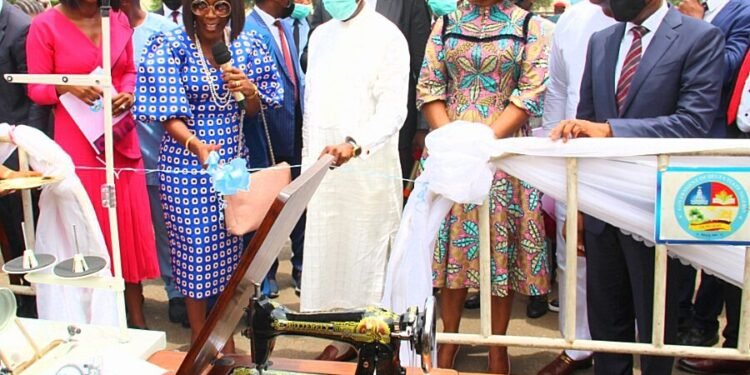Oghenekaro Igoh is an exemplar of entrepreneurship and job creation. A beneficiary of the Delta State enterprise development training programme, she shared her story in 2020.
“I had thought I would go into the traditional roadside tailoring, but after the training at Songhai Delta, my mind opened to other possibilities beyond conventional fashion designing. I began to think of starting a fashion institute. After establishing with starter pack, I got a shop at City Complex and started school. The shop became too small in less than one year, and I saw the reason to expand. Therefore, I rented this three-bedroom for N350, 000 annually.
I do lots of adverts online. I currently have two billboards: each of them costs N80, 000 monthly. My students come from within and outside Delta State, and I realise my funding through training fees. I have thirty students while six people have graduated. I run morning and afternoon sessions. I make clothes quite all right, but my niche is training for both males and females interested in fashion.”.
Nigeria is a paradox in several areas, including the critical role of youths. A recent survey shows that youths lead in entrepreneurship in the country and have the drive and energy to reduce the growing unemployment challenge. Delta State is one of a few states that understand the critical role of government as an enabler in unleashing youth’s potential

in entrepreneurship.
Rukevwe German holds an HND in Electrical Electronics Engineering, and like any young man, his dream was to work in an oil servicing company. He carried his certificate from one oil company to the other, submitting his CV and attending endless interviews that yielded no results. Five years after graduation, fortune came his way when he enrolled in the State Government’s job creation programme. The Job Creation Office established him with an HP laptop, a printer, a generator, a workstation and N50000 cash as rent subsidy for his shop. Barely two years after establishment, Rukevwe has made astonishing progress and diversified into other businesses with multiple income streams.
As the CEO of Big GG Communication in Warri, he is an Electrical Engineer, Information and Communication Technologist, laptop/mobile phone technician, accessories merchant, instructor, trainer and a point of sales (POS) agent to Zenith Bank. ” I am because of the training I received from job creation STEP. Next month I am getting married. I now have a rented apartment; I no longer live with my parents. I have trained three persons; one was for free. I am a graphic designer; I repair laptops and mobile phones, have two POS centres, sell accessories and am an instructor at Complete Computer Technology. The patronage is good. My vision is to own a computer training institute.”
The Delta State scheme directly addresses the UN Sustainable Development Goals Number 8, which seeks to create “decent work and economic growth”.
Rukevwe further testifies. “The job creation programme is one of the best things that happened to me. The programme is very credible. I saw it online. I applied and got it without knowing anyone. I pray it continues and those other governors after Senator Okowa will continue with the vision. I see it as a generational vision,” he stated.
Nigerian Bureau of Statistics data shows that MSMEs (Micro, Small and Medium Enterprises) account for 49.8 per cent of Nigerian GDP. The small businesses keep the economy buzzing despite the challenges of oil and gas and our inability to manage the actual economic rates of interest, exchange, and inflation. “Entrepreneurs are the bedrock of the Nigerian economy”, Entrepreneurship in Nigeria Report 2021 states.
What do these MSMEs do? The research shows that Nigeria’s small businesses play mainly in retail, fashion, and FMCG. They are in agriculture, fishing and forestry, hospitality, and hotel businesses.
A significant concern of planners everywhere is the Malthusian population bulge and its consequences for economies and nations. Technology and changes in production practices averted the Malthusian nightmare. Entrepreneurship holds promise for countries such as Nigeria, with an overwhelmingly huge youth population and the backdrop of poor economies.
Delta State found a way of keeping youth engaged and active in positive endeavours. Prof Eric Eboh is the Chief Job Creation Officer running programmes in the local governments that bring hope, skills and smiles to young Deltans. The focused human capital development programme Delta State embarked upon in the Ifeanyi Okowa years enabled it to advance technical and vocational education in line with a policy emphasis on skills acquisition. A strategic thrust involved increasing access.
Delta State rehabilitated six technical colleges and is building ten new ones. The Delta State Government upgraded three institutions to universities in tertiary education in 2021. They are the University of Delta (former College of Education), Agbor, the Delta State University of Science and University (former Delta State Polytechnic), Ozoro, and Dennis Osadebey University (former campus of Delta State University), Anwai, Asaba.
Okowa’s Delta State understands Nigeria’s nexus of entrepreneurship, youth, and capacity development. He who is faithful in small things would undoubtedly deliver on bigger things.

•Text, except headline, courtesy and of BizWatchNig










